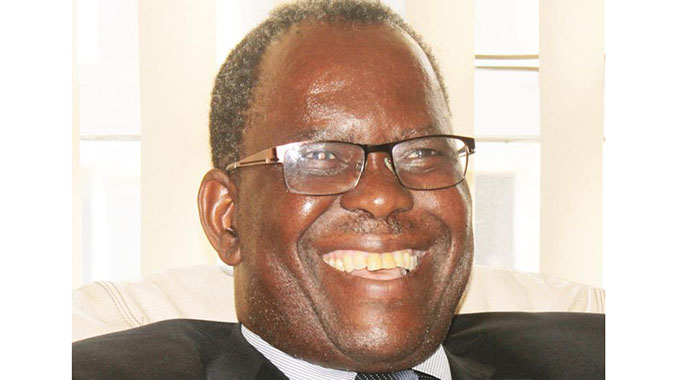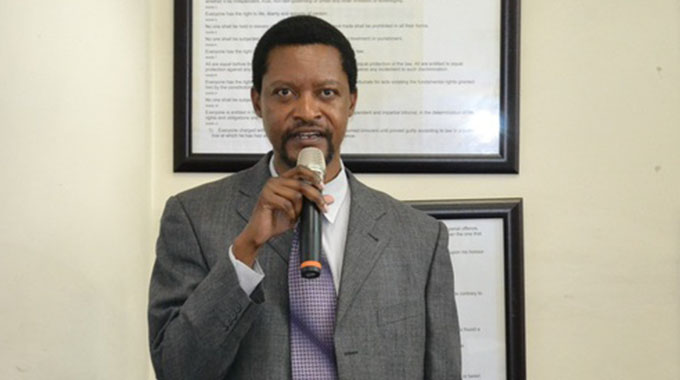Meet a man with duty to country

2nd Republic Profiles with Leroy Dzenga
GROWING up in rural Masvingo, Professor Fanuel Tagwira wanted to be a driver. That was as far as the colonial system he grew up in could allow him to dream despite his brilliant mind.
Many young people of his time fell victim to the same system, even he had to be resolute to further his education.
Many years later, Prof Tagwira finds himself in the cockpit of the country’s higher education as the Permanent Secretary in the Ministry of Higher and Tertiary Education, Science and Technology Development, an opportunity he relishes with optimism.
“I went to primary school in rural Masvingo Province. After that I went to Mashoko Mission for my high school.
“After I finished high school, my father told me that I needed to find a job and supplement the family income since I was the first born. My father was a plumber and my mother worked around the village,” said Prof Tagwira.
He went into temporary teaching and a chance meeting changed his destiny.
“After my O-Levels, I had enrolled as a teacher, although my heart yearned for progression to A-level. I worked for three months, and one day I met a white man who was the RDC chief executive officer.
“He asked me why I wasn’t in school and I told him my situation,”
Prof Tagwira recounted the life-changing encounter.
“At the time I had not been paid for the three months I was in teaching and the man told me to go to Gokomere High School and use my salary to pay for the whole Lower Sixth year.
“He told me to leave right away and we would inform my parents later. I slept in the bus that night, the urge to go to A-Level would not let me miss the 4am bus, this was the year 1976 by the way,” he recounted.
The school term had already gone, but his compelling story prompted the school to enrol him. His father agreed to pay for the final year despite indicating earlier that he was not prepared to meet the cost.
“When it was time to go to university, that was when a rule was introduced that those who want to go to university were supposed to first serve in the Rhodesian army before they proceeded,” Prof Tagwira narrated.
“Fortunately for me, I had been applying to universities in the region and internationally, so I left Zimbabwe for Lesotho seeking a scholarship for refugees,” he said.
He met with nationalist Zimbabweans who were working in the kingdom, organising scholarships for Zimbabweans just after his arrival.
“I met with Dr Stan Mudenge and Dr Mashingaidze who were helping Zimbabwean students get funding for studies in other countries.”
He completed his studies in Lesotho and graduated with a Bachelor of Science in Biology and Chemistry from the National University of Lesotho and then returned to Zimbabwe.
“From 1982 to 1991, I worked in the then Ministry of Agriculture, which is now Ministry of Lands, Agriculture, Water, Climate and Rural Resettlement.
“I worked for 10 years as a research scientist. I was also head of the soil fertility and crop development department,” said Prof Tagwira.
He then answered the call to academia, which according to him was growing louder by the day.
“In 1992, I decided I wanted to go into academia. I joined the new university which was starting in Mutare, Africa University. I rose through the ranks within the university from a senior lecturer to an associate professor to a professor before I became the dean of the School of Agriculture and Natural Resources,” he said.
“I was selected to become the third vice chancellor of Africa University, this was in 2007. I stayed in the post until 2014,” Prof Tagwira said.
He later left Africa University to go to the United States where he was a visiting Professor at Purdue University in Indiana State for a year.
Prof Tagwira got an opportunity to join the American institution full time, but commitment to country was greater than pieces of silver which were on offer.
“When I went to the United States, I was very close to the man who was the dean in the school I was in. He asked me if I really needed to return to Zimbabwe and offered me a job. I kindly refused the offer.
“I told them I had always preached patriotism to my family, what would they think if they heard that at my age I was relocating permanently to another country?” he said.
This was not the first time he had battled against thoughts of leaving his home country for good.
“I still remember when the economy started getting bad around 2006, I met a friend who asked me why I was struggling in Zimbabwe when I could earn a fortune with my qualifications and publications elsewhere. I had important research projects at the time and could not afford to leave,” said Prof Tagwira.
On his return from the United States, he was re-engaged at Africa University as an endowed Professor-Chair of Agronomy in the College of Health, Agriculture and Natural sciences.
Now that he is among the new permanent secretaries shouldering the nation’s hopes, Prof Tagwira is well-briefed on the task awaiting him.
“I believe this is the time we have been waiting for. The new dispensation is giving us an opportunity to unite as a country, work together and build the nation,” he said.
His portfolio will bring him closer to the demographic he has been passionate about throughout his years in academia.
“I am a person who loves young people. I have sent many young people to school. Many of them up to university who are not even my children. One leads an NGO and others are doing well in their different professions,” said Prof Tagwira.
He added; “Sometimes I see how disgruntled young people are and I don’t blame them. Some of them don’t have jobs. We are going to work to ensure there are decent opportunities for our youths through science and technology as well as improving the nation’s tertiary education.”
With a philosophy premised on building long-term solutions for the country’s future than quick fixes, it appears there is a formidable team in Prof Tagwira and Prof Amon Murwira at the Ministry of Higher and Tertiary Education, Science and Technology Development.
Prof Tagwira says; “The crowns of any man’s achievement should not be measured through the institutions they build, but the lives they transform.”
He says those are the words that have driven him to be where he is today.
Prof Tagwira holds a BSc in Biology and Chemistry from the National University of Lesotho, MSc Soil Chemistry from Reading University in England and PhD in Soil Chemistry and Fertility from the University of Zimbabwe.
Feedback: [email protected]








Comments